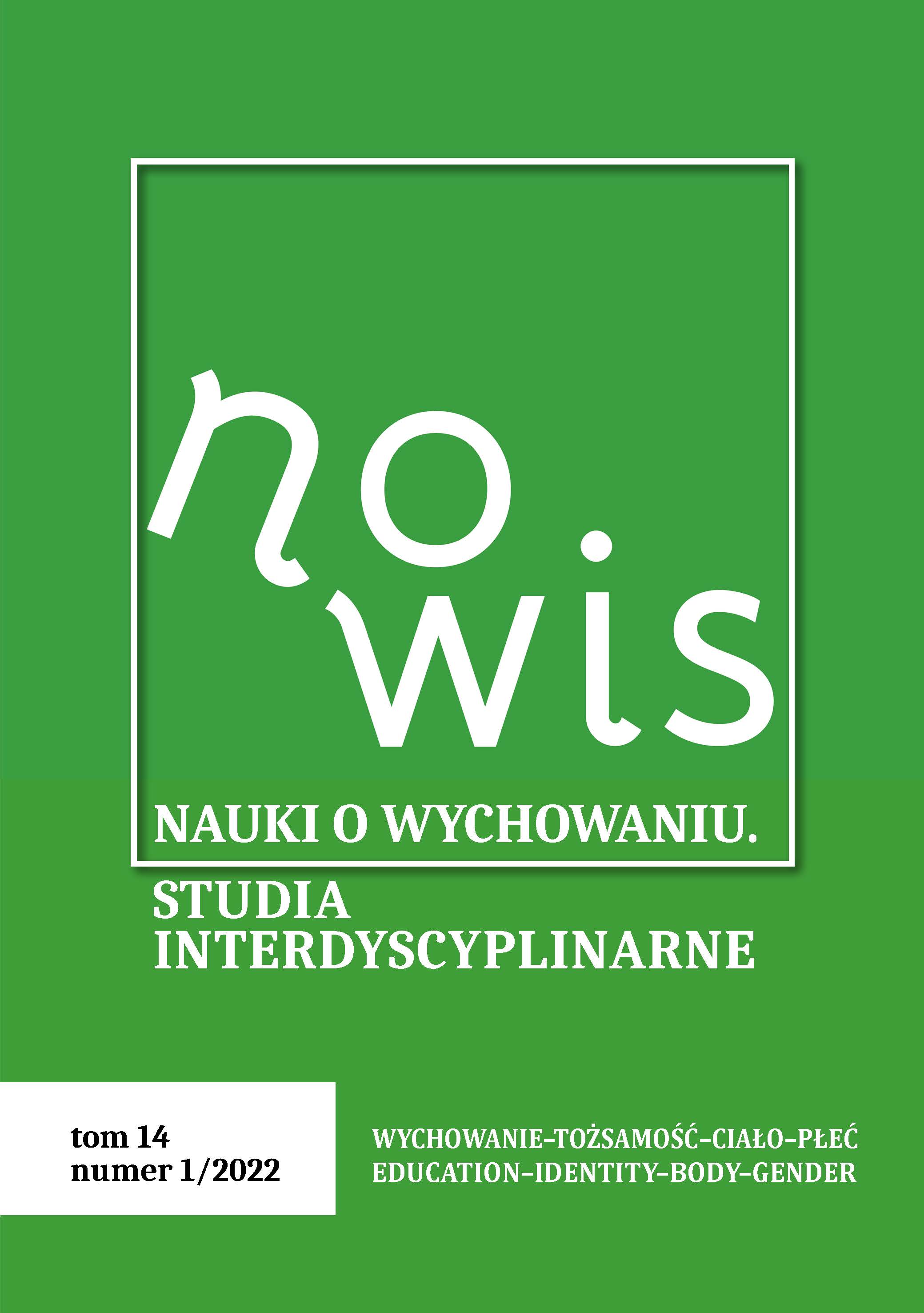Praca nad odczuciami. Matki w obliczu trudnych doświadczeń szkolnych ich dzieci
DOI:
https://doi.org/10.18778/2450-4491.14.10Słowa kluczowe:
praca nad odczuciami, wywiad narracyjny, matka, nauczyciel, szkołaAbstrakt
Celem niniejszego artykułu jest rekonstrukcja typów pracy nad odczuciami, jaką wykonują matki w kontekście trudnych doświadczeń szkolnych swoich dzieci. Ramą interpretacyjną dla analizy działań kobiet była kategoria pracy nad odczuciami opracowana przez Anzelma Strauss’a i jego współpracowników. Analizie poddane zostały autobiograficzne wywiady narracyjne z kobietami-matkami, gromadzone w ramach międzynarodowego projektu ISOTIS. Dane empiryczne zostały poddane procedurze kodowania, stosowanej w generowaniu teorii ugruntowanej, co umożliwiło wyodrębnienie sześciu typów pracy nad odczuciami: pracę nad interakcjami, nad zachowaniem spokoju, nad zaufaniem, biograficzną, nad tożsamością i naprawczą. Wyniki analiz wskazują, że matki są kluczowymi postaciami zinstytucjonalizowanego procesu kształcenia, które wykonują w toku codziennych praktyk szereg złożonych, ale niezauważanych działań. Zidentyfikowanie i charakterystyka pracy matek nad odczuciami pozwoliła opisać jej znaczenie dla realizacji zadań zawodowych przez nauczycieli, a także funkcjonowania dzieci w szkole.
Bibliografia
Babicka-Wirkus A. (2016) (Nie)normatywność rytuałów oporu w szkole „Teraźniejszość. Człowiek. Edukacja”, t. 19, nr 1(73), s. 73–86.
Google Scholar
Babicka-Wirkus A. (2019) Kultury oporu w szkole. Działania – motywacje – przestrzeń, Warszawa, Wolters Kluwer.
Google Scholar
Blumer H. (1954) What is Wrong with Social Theory?, „American Sociological Review”, t. 19, nr 1, s. 3–10, https://doi.org/10.2307/2088165
Google Scholar
DOI: https://doi.org/10.2307/2088165
Bourdieu P. (1986) The Forms of Capital, w: Handbook of Teory and Research for the Sociology of Education, J. G. Richardson (red.), New York, Greenwood, s. 241–258.
Google Scholar
Charmaz K. (2009) Teoria ugruntowana. Praktyczny przewodnik po analizie jakościowej, tłum. B. Komorowska, Warszawa, Wydawnictwo Naukowe PWN.
Google Scholar
Cottingham M. D. (2016) Theorizing emotional capital, „Theory and Society”, t. 45, nr 5, s. 451–470, https://doi.org/10.1007/s11186-016-9278-7
Google Scholar
DOI: https://doi.org/10.1007/s11186-016-9278-7
David M., West A., Ribbens J. (1994) Mothers’ intuition? Choosing secondary schools, London, The Falmer Press.
Google Scholar
Epstein J., Dauber S. (1991) School Programs and Teacher Practices of Parent Involvement in Inner-City Elementary and Middle Schools, „The Elementary School Journal”, t. 91, nr 3, s. 289–305, https://doi.org/10.1086/461656
Google Scholar
DOI: https://doi.org/10.1086/461656
Gillies V. (2006) Working class mothers and school life: exploring the role of emotional capital, „Gender and Education”, t. 18, nr 3, s. 281–293, https://doi.org/10.1080/09540250600667876
Google Scholar
DOI: https://doi.org/10.1080/09540250600667876
Granosik M. (1997) Niektóre aspekty pracy nad rozumieniem upośledzonego, „Studia Socjologiczne”, nr 1(144), s. 85–109.
Google Scholar
Griffith A., Smith D. (2005) Mothering for schooling, New York, Routledge, https://doi.org/10.4324/9780203997895
Google Scholar
DOI: https://doi.org/10.4324/9780203997895
Hochschild A. R., Machung A. (1989) The second shift: working parents and the revolution at home, New York, Viking Press.
Google Scholar
Jeynes W. (2005) A Meta-Analysis of the Relation of Parental Involvement to Urban Elementary School Student Academic Achievement, „Urban Education”, t. 40, nr 3, s. 237–269, https://doi.org/10.1177/0042085905274540
Google Scholar
DOI: https://doi.org/10.1177/0042085905274540
Kamińska-Jatczak I. (2020) Aktywności ukierunkowane na odczucia rodzin w pracy socjalnej asystentów rodziny, „Annales Universitatis Mariae Curie-Skłodowska”, t. 33, nr 1, s. 103–118, https://dx.doi.org/10.17951/j.2020.33.1.103-118
Google Scholar
DOI: https://doi.org/10.17951/j.2020.33.1.103-118
Kunicka M. (2012) Władza, przymus i wolność w edukacji, „Opuscula Sociologica”, nr 1(1), s. 31–44.
Google Scholar
Lareau A., Horvat E. M. (1999) Moments of inclusion and exclusion: race, class and cultural capital in family–school relationships, „Sociology of Education”, t. 72, nr 1, s. 37–53, https://doi.org/10.2307/2673185
Google Scholar
DOI: https://doi.org/10.2307/2673185
Leśniak B. (2015) Szkoła jako źródło sytuacji trudnych, „Teraźniejszość. Człowiek. Edukacja”, t. 18, nr 3(71), s. 101–111.
Google Scholar
Nowotny H. (1981) Women in public life in Austria, w: Access to Power: Cross-national Studies of Women and Elites, C. F. Epstein, Coser R. L. (red.), London, Allen &Unwin, s. 147–156, https://doi.org/10.4324/9780429423819-9
Google Scholar
DOI: https://doi.org/10.4324/9780429423819-9
O’Brien M. (2008) Gendered capital: emotional capital and mothers’ care work in education, „British Journal of Sociology of Education”, t. 29, nr 2, s. 137–148, https://doi.org/10.1080/01425690701837505
Google Scholar
DOI: https://doi.org/10.1080/01425690701837505
O’Brien M. (2005) Mothers as educational workers: mothers’ emotional work at their children’s transfer to second-level education, „Irish Educational Studies”, t. 24, nr 2–3, s. 223–242, https://doi.org/10.1080/03323310500435513
Google Scholar
DOI: https://doi.org/10.1080/03323310500435513
O’Brien M. (2007) Mothers’ emotional care work in education and its moral imperative, „Gender and Education”, nr 19(2), s. 159–177, https://doi.org/10.1080/09540250601165938
Google Scholar
DOI: https://doi.org/10.1080/09540250601165938
Reay D. (1998) Class work: Mothers involvement in their children’s primary schooling, London, University of London Press.
Google Scholar
Reay D. (2000) A useful extension of Bourdieu’s conceptual framework? Emotional capital as a way of understanding mothers’ involvement in their children’s education, „The Sociological Review”, nr 48, s. 568–585, https://doi.org/10.1111/1467-954X.00233
Google Scholar
DOI: https://doi.org/10.1111/1467-954X.00233
Schütze F. (1997) Trajektoria cierpienia jako przedmiot badań socjologii interpretatywnej, „Studia Socjologiczne”, nr l, s. 11–57.
Google Scholar
Schütze F. (2008) Biography Analysis on the Empirical Base of Autobiographical narratives: How to analyse autobiographical narrative interviews. Part one, „European Studies on Inequalities and Social Cohesion”, nr 1–2, s. 153–242.
Google Scholar
Shumow L., Miller J. D. (2001) Parents’ At-Home and At-School Academic Involvement with Young Adolescents, “The Journal of Early Adolescence”, t. 21, nr 1, s. 68–91, https://doi.org/10.1177/0272431601021001004
Google Scholar
DOI: https://doi.org/10.1177/0272431601021001004
Smith D. E. (1996) The underside of schooling: restructuring, privatisation and women’s unpaid work, „Journal for a Just and Caring Education”, t. 4, nr 1, s. 11–29.
Google Scholar
Smith D., Griffith A. (1990) Co-ordinating the uncoordinated: Mothering, schooling and the family wage, „Perspectives on Social Problems”, t. 2, nr 1, s. 25–43.
Google Scholar
Strauss A., Fagerhaugh S., Suczek B., Wiener C. (1982) Sentimental work in the technologized hospital, „Sociology of Health & Illness”, t. 4, nr 3, s. 254–78, https://doi.org/10.1111/1467-9566.ep10487954
Google Scholar
DOI: https://doi.org/10.1111/1467-9566.ep10487954
Strauss A., Fagerhaugh S., Suczek B., Wiener C. (1991) Illness Trajectories w: Creating Sociological Awareness. Collective images and Symbolic Representations, A.L. Strauss, New Brunswick-London, Transaction Publishers, s. 157–174.
Google Scholar
Ślęzak I. (2018) Praca nad zaufaniem. Etyczne, praktyczne i metodologiczne wyzwania w relacjach badacz–badani na przykładzie etnografii agencji towarzyskich, „Przegląd Socjologii Jakościowej”, t. 14, nr 1, s. 138–162, https://doi.org/10.18778/1733-8069.14.1.07
Google Scholar
DOI: https://doi.org/10.18778/1733-8069.14.1.07
Weiss H., Caspe M., Lopez, E. (2006) Family involvement in childhood education, „Family Involvement Makes a Difference”, nr 1, https://archive.globalfrp.org/publications-resources/publications-series/family-involvement-makes-a-difference/family-involvement-in-early-childhood-education [dostęp: 15.11.2021].
Google Scholar
Zemblyas M. (2007) Emotional capital and education: theoretical insights from Bourdieu, „British Journal of Educational Studies”, t. 55, nr 4, s. 443–463, https://doi.org/10.1111/j.1467-8527.2007.00390.x
Google Scholar
DOI: https://doi.org/10.1111/j.1467-8527.2007.00390.x






 Strona czasopisma, prowadzona przez Zespół redakcyjny NOWiS na platformie Index Copernicus:
Strona czasopisma, prowadzona przez Zespół redakcyjny NOWiS na platformie Index Copernicus: 





